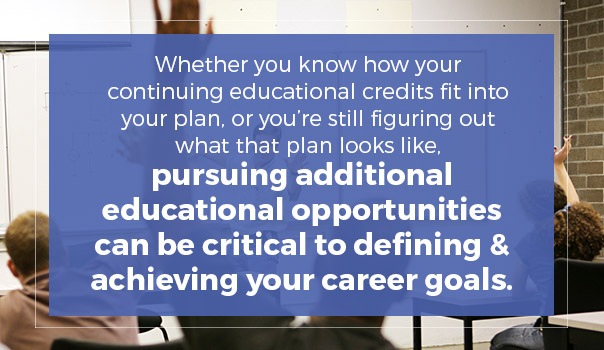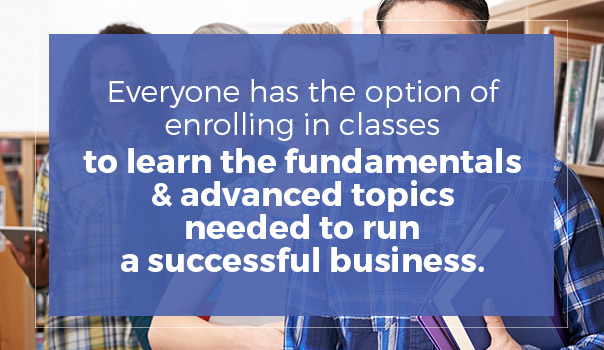
Unfortunately, this attitude could be detrimental to the career you worked so hard to earn. The truth is, continuing education offers tangible and financial benefits for professionals in just about every industry, at any stage of their careers. Whether you’re looking to move up out of your entry-level job or you’ve accrued quite a few years of experience, you can benefit from going back to school. Let’s take a look at these benefits.
Keep Up With Technology
Technological advancements are changing the world before our eyes. Entire industries have sprung out of the fertile ground of Silicon Valley practically overnight. Computer technology has impacted every corner of the globe and every aspect of our daily lives.
By enrolling in continuing education courses, you can stay current on the technological advances that are impacting your industry. Employers consider technological competence to be a prerequisite for just about any job posting you’ll find.
Keep Up With New Techniques
In addition to technological advances, your industry has likely benefited from new information and products. If you stopped learning when you left college, how are you going to stay up-to-date in your field? By enrolling in continuing education courses, you can keep in step with the fast-changing world around you.
Focus On Career Goals
If you’re the pro-active kind of person who has your career path mapped out, chances are you know with absolute certainty where continuing education fits into that plan. Whether it’s an advanced degree required for an upper-level position, or technical specializations to become an expert in your field, you already know what extra credits you need to achieve your career goals.
Conversely, you might be in your current position as a result of circumstance, rather than a deliberate plan. Perhaps you didn’t have any specific job or industry in mind when you entered the workforce, and you don’t have much of a path forward. If this is the case, enrolling in a continuing education program might unveil some possibilities you hadn’t previously considered.

Whether you know how your continuing educational credits fit into your plan, or you’re still figuring out what that plan looks like, pursuing additional educational opportunities can be critical to defining — and achieving — your career goals.
Show Your Commitment
We’ve seen all of the job listings use words like “self-motivated”, “career-oriented” and “goal-driven”. Employers want to know that you’re taking your career seriously. Hopefully, your employer will provide you with continuing education opportunities, but you should take the initiative in any case. Show them that you care about your job and career, and you will be rewarded. If not by your current employer, then by the next company that sees your impressive combination of experience and education.
Improve Your Earnings Potential
Even if you don’t parlay your continuing education credits into a completely new position, you might be eligible for a raise in your current position. Many positions tie education requirements to the salary range, so even if you stay in your current position, you may be able to leverage your educational attainment into a raise.
Additionally, adding education to your accrued experience is the most common way to position yourself to move up the career ladder. Whether it is within your company or with a perspective employer, the more credentials you can pack on your resume, the more easily your resume will rise to the top of the candidate pool for that new position.
Broaden Your Expertise
The quickest way to make yourself more valuable to an employer is to become more versatile. By furthering your education, you can acquire skills and knowledge in multiple areas, and take them back into the workplace. If you can show competence in multiple areas, your employer will look to you for projects that require interdepartmental cooperation. If you work for a smaller company, your employer will no doubt appreciate being able to stretch resources further, especially if they know you can handle multiple assignments.
Improve Your Creativity
Learning new skills and information can also help to stoke the creative fires. Learning brings new ideas to the surface and helps break you out of your normal routines and decision-making models that lead to stagnation. By implementing these new skills, you can approach work problems with a fresh perspective and help to push boundaries that might previously have limited your potential and productivity.
Plus, a comprehensive British study showed that adult education can actually make you smarter, in the sense that your cognitive function is improved, not just in the “I went to school and I learned new stuff” sense.
Scratch a Personal Itch
If you can afford the luxury of a structured academic program, you’ll be required to take courses outside your core discipline. While this seems like wasted time and energy, you should look at it as an opportunity to pursue personal passions outside your field of study.
Very few people possess such personal focus as to be wholly defined by their profession. The rest of us have hobbies and interests we pursue at home, or curiosities that have always fascinated us. If you’ve the time and the patience, this could be your best opportunity to learn about something completely unrelated to your professional goals. If you’ve always wanted to take an art history course, or a music appreciation class, this is a golden opportunity.
Improve Your Business Skills
If you currently work for company, but have considered striking out on your own, you will have to wear more hats (metaphorically speaking). It won’t be enough just to be good at what you do; you will also have to be an astute and successful businessperson.

Not everyone is born with natural talent and business acumen, and not everyone had the fortune of learning important business lessons from their father at the dinner table. Thankfully, everyone has the option of enrolling in classes to learn the fundamentals and advanced topics needed to run a successful business. Courses in entrepreneurship don’t even require that you enroll in a four-year degree program or an MBA-type course. Because there are no educational prerequisite for owning your own business, educational institutions all across the country are creating curriculums specifically designed to teach non-academics the skills required to own and operate a small business.
Increase Job Satisfaction
Job satisfaction and personal fulfillment depend on a number of factors. You can contribute to your own workplace happiness by increasing your competence and knowledge to improve your performance. According to a national poll, job satisfaction rates improve from 40% to 58% when individuals without a diploma are compared to individuals with a bachelor’s degree or better.
The idea is simple: the more competent you feel, the better you will perform and the more satisfied you will be with your job performance. A confident employee is generally a happy employee. Of course, other factors in job satisfaction are out of your control, but this is something you can control.
Demonstrate Leadership Qualities
An entire industry has been created to study and improve organizational leadership, so thousands of volumes have been written about the qualities of an effective leader. It is impossible to distill all of this knowledge into one section of a blog post, but one lesson does fit into our discussion.
One of the most commonly-cited qualities of an attractive leadership candidate is the self-motivated individual who pro-actively seeks out professional self-improvement. Pursuing continuing education will demonstrate leadership potential. Additionally, your educational attainment should improve your job performance, which will be another favorable trait when your company is considering you for a leadership role.
Position Yourself for Success
Everyone wants unconditional job security, but few of us will enjoy it throughout an entire career. Especially given the recent economic ups and downs, you can be prepared for bad news by keeping your knowledge and skills current and competitive in the job market.
We touched on it earlier, but if you should find yourself back in the job market unexpectedly ten or fifteen years into your career, you don’t want to be applying for jobs with a ten year old skill set. Taking advantage of continuing education opportunities will help to keep your job prospects robust, even if you didn’t plan to be looking for a new job.
Increase Your Viability
As we’ve mentioned already, furthering your education after you’ve entered the professional world will strengthen your resume when the time comes to enter the job market — whether you planned to be looking for a new job or not.
Keep Your Eyes on the Future

As we saw at the end of the previous decade, seismic shifts in “the way we do business” can strike any industry at any time. If you’re ten or twenty years into your career and are that far removed from your last formal education, you’re working with a skillset that is borderline archaic. If your industry experiences another revolution or evolution in “the way business is done”, are you equipped to keep up, or will you be left behind?
Any good continuing education program will prepare students for the future of the industry, not the past. Curriculums incorporate the newest technology, the newest techniques and give students an idea of what is happening out on the cutting edge. In order to position yourself for the future of your industry, you need to be involved in these conversations and learn those new skills.
Grow Your Professional Network
As you work on building your career, professional relationships are an invaluable asset. Creating connections within your company can help you move up the ladder at work, but reaching out beyond your own building can provide numerous benefits.
By connecting with professionals in other companies and industries, you can enrich your own professional experience and qualifications. It also can’t hurt to have personal connections to call on if you find yourself suddenly out of a job.
If you don’t have opportunities to attend industry events and make those connections, school is a great resource. The fellow students and the professors you meet during the course of your education will be a fantastic start to a meaningful professional network.
Take Advantage of Unprecedented Flexibility — Online Learning vs. Traditional Classroom
We’ve covered a host of examples of how continuing education can improve your career prospects and job satisfaction, but you may be thinking to yourself, “I’m so busy, I don’t have time to pursue an advanced degree!”
Fortunately, not all industries require you to commit to an entire degree program. For example, just a few classes and certifications here and there are all you need in the trades and heavy industry, where a master’s degree doesn’t hold any advantage.
If you do plan to pursue an entire degree program, you still have options. Thanks to the myriad technological advancements brought about by the Internet, you have nearly infinite flexibility in how you pursue your education. Traditional programs focused on classroom instruction do certainly exist, but you have dozens of options if you prefer to complete your coursework from the comfort of your own home.
Online degree programs from accredited institutions adhere to the same academic rigor as traditional programs, so you can be confident that you’re getting the same high-quality education. Furthermore, educational programs available online and in person don’t always adhere to the traditional semester-based academic calendar, so don’t feel like you have to rearrange your life to start your education in September or January.
Before you decide on an educational program, you should research the options in your industry to decide what path would give you the most benefit. Don’t spend time and energy on a complete degree program if your industry doesn’t require it. If it does, make sure you find a high-quality academic institution with a respected program, to boost credibility. Do the research to find a program that fits into your lifestyle and your schedule, even if it demands a little extra leg work. There are simply too many options out there for anyone to say they can’t find one that works for them.
The Next Step
We’ve explained how continuing education opportunities can benefit your career, your job prospects and even your job satisfaction. We’ve also allayed your fears about finding a program and schedule that can fit into your busy lifestyle. Now it’s your turn.
Consult your employer, your supervisor and your family to decide what you hope to accomplish with your continuing education credits. Find an institution with a program that suits your needs. Register for courses, and take the first steps towards career advancement!
